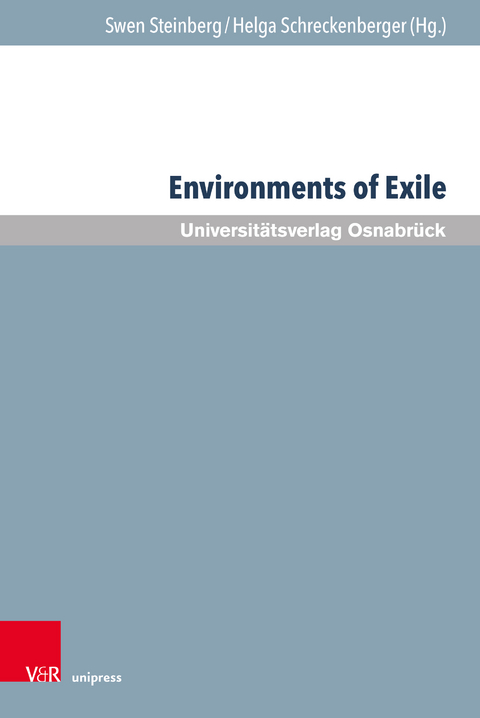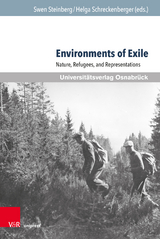Environments of Exile
Nature, Refugees, and Representations
Seiten
2024
|
1. Edition 2025
V&R unipress (Verlag)
978-3-8471-1694-3 (ISBN)
V&R unipress (Verlag)
978-3-8471-1694-3 (ISBN)
How do Natural Environments impact Success or Failure of Migration?
Forced Migration always takes place within specific cultural, social, political, and spatial environments. This volumes focuses on the interaction between those forced to migrate and their environments in the contexts of escape and exile from Nazi-occupied Europe. Forced emigration from Nazi Germany was a global phenomenon that took refugees primarily from Central Europe to continents and countries they often knew very little about. Not only did they have to adapt to foreign cultures but also to unfamiliar natural environments that often exposed them to severe temperature conditions, droughts, rainy seasons and diseases. While some refugees prepared for the natural conditions of their exile destination others acquired environmental knowledge at their host countries or were able to adapt prior knowledge-about cultivation methods, for example, or species, products, and sales markets-to the new environment. Consequently, specific knowledge about the environment had a large influence on the success of the migration experience. Moreover, just as the migrants shaped their new environments, they were shaped by them.
Forced Migration always takes place within specific cultural, social, political, and spatial environments. This volumes focuses on the interaction between those forced to migrate and their environments in the contexts of escape and exile from Nazi-occupied Europe. Forced emigration from Nazi Germany was a global phenomenon that took refugees primarily from Central Europe to continents and countries they often knew very little about. Not only did they have to adapt to foreign cultures but also to unfamiliar natural environments that often exposed them to severe temperature conditions, droughts, rainy seasons and diseases. While some refugees prepared for the natural conditions of their exile destination others acquired environmental knowledge at their host countries or were able to adapt prior knowledge-about cultivation methods, for example, or species, products, and sales markets-to the new environment. Consequently, specific knowledge about the environment had a large influence on the success of the migration experience. Moreover, just as the migrants shaped their new environments, they were shaped by them.
Dr. Thomas F. Schneider ist Privatdozent für Neuere Deutsche Literatur an der Universität Osnabrück und leitete bis Ende 2022 dort das Erich Maria Remarque-Friedenszentrum.
Dr. Swen Steinberg ist Assistent Professor am Fachbereich Geschichte der Queen's University in Kingston/Ontario, Kanada, und wissenschaftlicher Mitarbeiter am Deutschen Historischen Institut in Washington/DC, USA.
Helga Schreckenberger is the Wolfgang and Barbara Mieder Green and Gold Professor of German at the University of Vermont, USA.
| Erscheinungsdatum | 25.11.2024 |
|---|---|
| Reihe/Serie | Schriften des Erich Maria Remarque-Archivs ; Band 036 |
| Co-Autor | Thomas F. Schneider, Asher Goldstein, Reinhard Andress, Hadwig Kraeutler, Marlen Eckl, Amanda Leslie, Jacqueline Vansant, Kirsten Krick-Aigner, Natalie Eppelsheimer |
| Zusatzinfo | with 17 figures |
| Verlagsort | Göttingen |
| Sprache | englisch |
| Maße | 160 x 237 mm |
| Gewicht | 418 g |
| Themenwelt | Geschichte ► Allgemeine Geschichte ► Zeitgeschichte |
| Geschichte ► Teilgebiete der Geschichte ► Kulturgeschichte | |
| Naturwissenschaften ► Biologie ► Ökologie / Naturschutz | |
| Sozialwissenschaften ► Soziologie | |
| Schlagworte | Environmental history • exile • forced migration • migration history • Nature • Refugees • Representation |
| ISBN-10 | 3-8471-1694-0 / 3847116940 |
| ISBN-13 | 978-3-8471-1694-3 / 9783847116943 |
| Zustand | Neuware |
| Haben Sie eine Frage zum Produkt? |
Mehr entdecken
aus dem Bereich
aus dem Bereich
Gewalt, Umwelt, Identität, Methode
Buch | Softcover (2024)
Spector Books OHG (Verlag)
36,00 €
wie Freud im Kollektiv verschwand
Buch | Hardcover (2024)
Klett-Cotta (Verlag)
25,00 €




